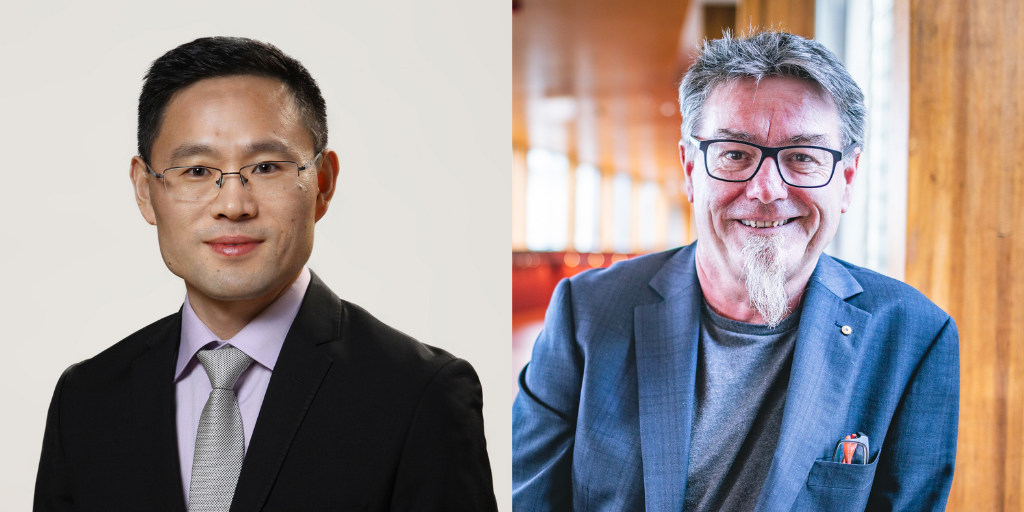News
3D printing bone tissue
Jun 28 2022
ACES are set to aid Åbo Akademi University as part of a new collaboration that will see a 3D REDI bioprinter delivered to Finland developed by University of Wollongong (UOW) researchers at the Translational Research Initiative for Cell Engineering and Printing (TRICEP).

Prof Chunlin Xu (left) and Prof Gordon Wallace (right)
Led by Prof Chunlin Xu and a team at the Laboratory of Natural Materials Technology at Åbo Akademi University as well as researchers from Alto University, the group will aim to establish a new green and cost-efficient biorefinery concept for a range of high-value applications.
As part of the project, funded by the Academy of Finland, the research will be supported by the newly developed intuitive and flexible 3D bioprinting platform, 3D REDI.
The collaboration comes about following a visit to UOW by Prof Xu as a Senior Research Fellow several years ago, which helped form a relationship with ACES and Director Prof Gordon Wallace.
To find out more about the project and collaboration, we caught up with Prof Xu.
Could you tell us a bit more about the project and what it involves?
To address UN Sustainability Goals, the current petroleum-based industry must be replaced with a green and sustainable alternative. Biorefineries, such as facilities that integrate biomass conversion processes and equipment to produce fuels, power, and value-added chemicals from biomass, are well suited for this purpose.
That being the case, the cross-disciplinary international AI-4-LCC team, including researchers from Åbo Akademi University and Alto University, will develop a new green and cost-efficient biorefinery concept for applications such as carbon fibers, thermoplastics and 3D objects. The project will also be aided by UOW with a 3D REDI printer delivered from TRICEP.
We hope that the research results will establish a roadmap for the adoption of wood-derived products in these advanced applications. This database of digitalised research data and results will serve as a future resource, to mine in the future via artificial intelligence (AI) methods the optimal processing conditions and thus, identify promising new investigation routes.
How did the collaboration with ACES and Prof Gordon Wallace come about?
Our research team at the Laboratory of Natural Materials Technology first established a collaboration with Prof Gordon Wallace in 2016 when I was as a senior visiting Research Fellow to UOW, conducted half a year researching mobility to jointly develop feasible approaches to exploitation of wood-based biopolymers in 3D printing. The collaboration has involved several research exchanges since.
What does the collaboration involve?
The planned collaborative research will include several research interactions to assist to tackle challenges in validation of new formulations from trees particularly with incorporation of biological cues for direct ink writing (DIW) process and in realising natural phenolic polymer lignin-based curable resins for digital light processing (DLP) approach.
The newly developed 3D bioprinter by TRICEP, 3D REDI, will be delivered to us at the Åbo Akademi University in Finland to facilitate the validation of the proposed research ideas.
Read more about the Laboratory of Natural Materials Technology research group here. You can also find out more about 3D REDI here.













